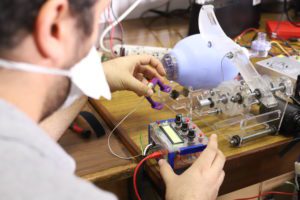This year has been unlike any other. We are struggling through a global pandemic that brings health and economic anxieties. Even as social distancing and cancelation of events have isolated us from each other, we have been reminded of how interconnected we are as the coronavirus marched across the globe. We have had to make difficult choices and ask difficult questions. We are asking ourselves, how do we respond to a year like this?
The students, faculty, and staff of the University of the Valley of Guatemala (UVG) have been asking these tough questions as well. Like experts around the globe, doctors and health professionals in Guatemala worked to prepare before COVID-19 was first detected there in mid-March. One of the highest areas of concern was the number of ventilators available—there were only a handful of ventilators in the entire country prior to the pandemic, in contrast to about 160,000 ventilators in the United States (UVG, Center for Health Security).
What would you do if your country needed ventilators?

The investigative centers at UVG sprang into action. In the face of a nation-wide curfew in Guatemala, researchers kept working diligently to support their community. By early May, they had adapted and improved an existing design to create a mechanical ventilator costing 100 times less than commercial ventilators (Prensa Libre). UVG researchers answered the call to help save lives in Guatemala.
As with universities around the world, UVG’s classes moved online in order to stop the transmission of COVID-19 on campus. Staff and students alike had to adapt. But for some students—especially those without reliable access to internet—moving to online classes was much more difficult.
What would you do if you relied on cellular internet to do your assignments, but you had no signal at home?
Catarina, a fourth-year student studying for her Bachelor’s in agricultural and livestock technology at UVG’s South Campus, faced this challenge. She lives in a rural area of the Escuintla department where reliable cell signal is scarce. So she climbs to the top of a nearby hill in order to have enough signal to do her coursework using her cell phone. Catarina is determined that coronavirus won’t interrupt her academic career, and despite the challenges, she is persevering.

Even before the COVID-19 pandemic, an academic career was a challenge for many young people in Guatemala. At UVG’s Altiplano Campus, which serves students in Guatemala’s largely indigenous highlands, nine of 10 students rely on financial aid to complete their education. For Catarina and her fellow students at UVG’s South Campus, 70% rely on financial aid. In this year unlike any other, your support can help close the gap and ensure that coronavirus doesn’t put the dreams of students on hold.
The question now is, what would you do if UVG’s students needed your help?
Please make a donation to USFUVG and help students in Guatemala achieve their academic dreams and prepare for the future, whatever it may bring.
